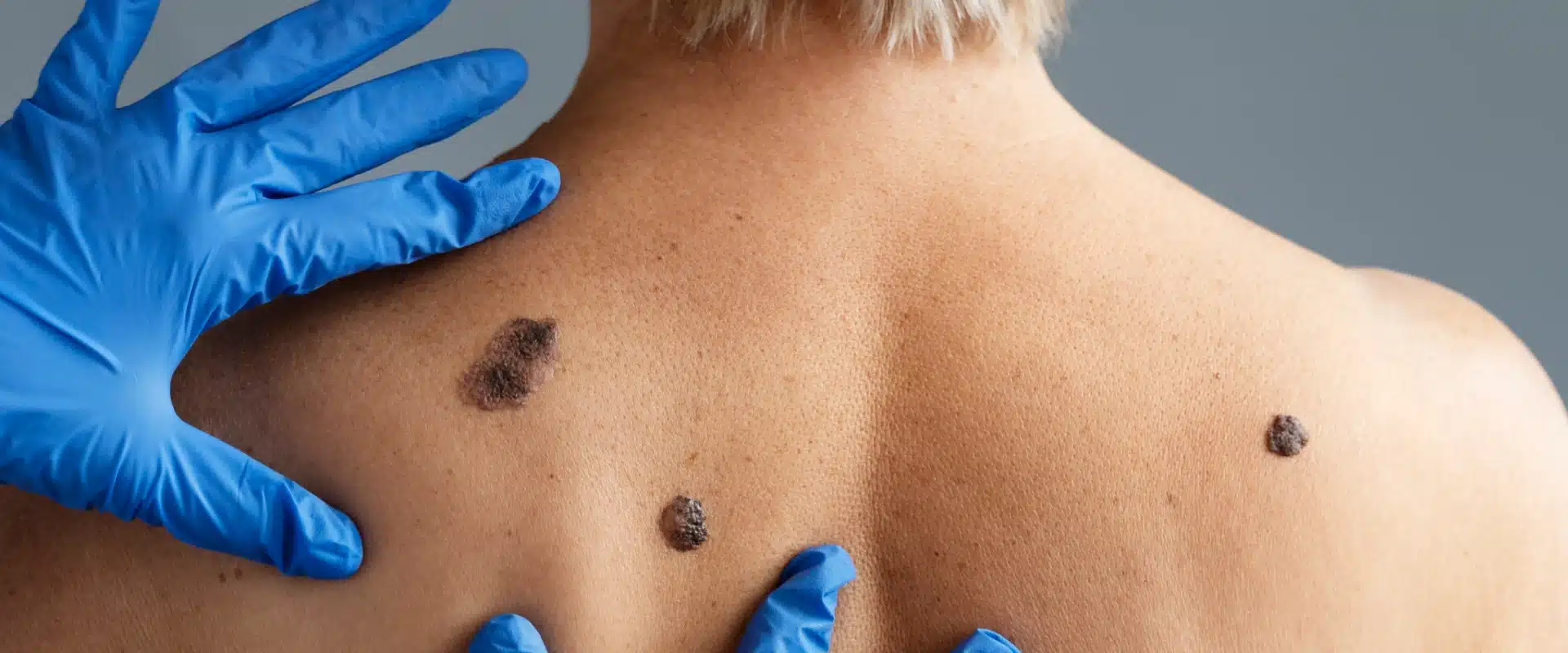Skin cancer is the most prevalent cancer in the United States, surpassing breast, lung, colon or prostate cancer, and also a significant health concern worldwide. The Skin Cancer Foundation estimates that one in five Americans may develop skin cancer once in their lifetime, necessitating the need for awareness and advancements in treatment. With increasing awareness, prevention, early diagnosis, and prompt treatment, the prevalence can decrease, and the outcome can be significantly improved.
Understanding Different Types of Skin Cancer:
- Actinic Keratosis (AK): It is the most common precancerous condition, characterized by dry, scaly, rough-textured patches or lesions on chronically sun-exposed areas such as the face, ears, lip, scalp, neck, forearms and back of the hands. Early diagnosis and treatment of actinic keratosis by a dermatologist is essential, as it can sometimes progress to squamous cell carcinoma if leftuntreated.
- Melanoma: Melanoma, one of the deadliest forms of skin cancer, develops in melanocytes (melanin-producing cells that give skin its characteristic colour) when damaged and grow uncontrollably. It can sometimes spread deep into skin layers, blood vessels, and lymphatics and is termed metastatic melanoma. Annual skin checkups and monitoring are essential for early detection and treatment, as it can spread quickly to other body organs.
- Squamous Cell Carcinoma (SCC): Second only to basal cell carcinoma in prevalence, SCC affects the skin’s squamous cells and is caused by chronic exposure to the sun’s harmful ultraviolet (UV) rays. The risk of developing SCC is high if a person has fair skin, blonde or red hair, a history of indoor tanning, has been diagnosed with actinic keratosis, a weakened immune system, has a family history of skin cancer, received radiation therapy, a history of exposure to coal tar products or arsenic. SCC is characterized by red, scaly patches or firm, red nodules that persist and can metastasize if treatment is delayed.
- Basal Cell Carcinoma (BCC): The most common type of skin cancer, BCC, develops in the basal cells and appears as a slightly transparent bump on the sun-exposed skin, though it can take various forms. BCC is generally less aggressive, is a pearly or waxy bump, often with a visible blood vessel, and can cause significant damage by growing and invading surrounding tissues.
Risk Factors, Prevention and Early Detection:
The most common cause of skin cancer is chronic sun exposure, caused by tanning or in professions involving long-term outdoor work. However, other factors also increase susceptibility, such as,
- Fair Skin, Light Hair, and Blue or Green Eyes
- Family history of skin cancer
- Diagnosed with actinic keratosis
- Weakened immune system
- Exposure to certain chemicals such as arsenic or coal tar products.
- Exposure to X-rays or UV rays
- Use of indoor tanning devices.
The best way to limit your chances of getting skin cancer is to avoid unprotected exposure to the sun’s UV rays. While going out, wear protective clothing and apply a broad-spectrum, water-resistant sunscreen with an SPF of 30 or more to all the exposed areas. Seek shade when appropriate lim Limit sun exposure during mid-day, and use extra caution near water, snow, and sand because they reflect the sun’s UV rays, increasing your chances of sunburn. Do not seek the sun so much, avoid tanning beds, and take vitamin D through diet and supplements. If you have noticed any unusual mole or nodule on your body, monitor it routinely for any growth or colour change, and get checked with a dermatologist for early detection and prompt treatment.
Final Thoughts:
Melanoma rates increase with age, alongside basal and squamous cell cancers, due to accumulated sun damage and reduced cell repair ability. Key signs of skin cancer include a changing mole or spot that differs from the rest, an itchy, bleeding, or painful growth, a colored band around a nail, or a sore that does not heal or reoccurs. For any new or changing mole, you must routinely conduct self-examination using the ABCDE test and schedule regular skin cancer screenings with a dermatologist.
At OnSite Dermatology, we understand the unique challenges that seniors face regarding their skin, and we are committed to providing expert care and advice tailored to their unique needs. We offer essential skin cancer screenings, treatments, and professional medical care without needing transportation, making it convenient and accessible for older adults to maintain healthy skin, especially in community centers and retirement homes. For more information or to schedule a consultation, fill in the form below or give us a call on (877) 345-5300.

